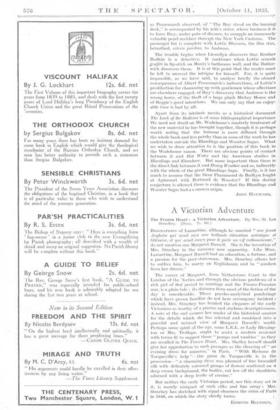A Victorian Adventure
Biocaman Ks of Lamartine, although he married " une jeune Angtaise real avail recu tErtC brillante education artistique et littt'rai re, et qui avail confer pour le poete rcn elf entitousiasme," do not mention one-Margaret Russell. She is the invention of Mrs. Strachey in the romance now appearing. Like Mine. Lamartine, Margaret Russell had an education, a fortune, and a passion for the poet-statesman.; Mrs. Strachey allows her to outlive him, to marry an Englishman and to " awaken from her dream."
The career of Margaret, from Nethcrstone Court to the London of the 'forties and through the obvious problems of a rich girl of that period to marriage and the Franco-Prussian war, is a plain tale ; its distance from most of the fiction of the day is considerable. Those psycho-analytical ponderings which have grown familiar do not here accompany incident ; instead; Mrs. Strachey has treated the elegance of the early 'Victorians as worthy of a precise and studious descriptiveness. A note at the end assures her reader of the historical sources for the details which she has selected and combined into a graceful and natural view of Margaret Russell's world. Perhaps some spirit of the age, some L.E.L. or Lady Blessing- ton or Mrs. - Trollope, ought to assist a modern reviewer with terms fit to suggest those " pomps and vanities " as they are recalled in The Frozen Heart. Mrs. Shelley herself should give her approbation to such passages as the choosing of " an evening dress ' for mamma," in Paris. " With Madame de Toequeville's help r—the great de Tocqueville is in the procession—" a charming dress was planned of fine brocaded silk with delicately coloured groups of flowers scattered on ;al deep cream background, the bodice, cut low off the shoulders, adorned with a deep berthe of ermine."
But neither the early Victorian period, nor this story set in it, is merely compact of such silks and fine array : Mrs, Strachey has sketched with equal clearness the crisis of Paris in 1848, on which the story chiefly turns. • EDMUND BLUNDEN.






























































 Previous page
Previous page